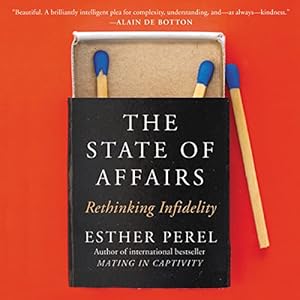The State of Affairs

Full Title: The State of Affairs: Rethinking Infidelity
Author / Editor: Esther Perel
Publisher: Harper Audio, 2017
Review © Metapsychology Vol. 21, No. 48
Reviewer: Christian Perring
Esther Perel takes an inquisitive and thoughtful approach to infidelity. She has a recent TED talk that summarizes many of her main themes. As a therapist, she has specialized in couples and individuals who are struggling with problems arising from infidelity. She takes a subtle approach aiming to understand why people have affairs even when they are in love with their partners or when they are taking huge risks by doing so. People even lie about affairs when they have open relationships. Her book explores many aspects of infidelity in a non-judgmental way, and although the chapters have different nominal topics, there is a lot of overlap between them. She illustrates her ideas with many examples of her clients and with stories that people have told her. She is a good writer with a crisp turn of phrase. So it is mostly enjoyable to go through the book, although at times it feels like it could have been a lot shorter without losing any information. She also overlaps with her previous book, Mating in Captivity: Reconciling The Erotic & the Domestic, discussing the causes of declining sexual drives in long term relationships.
With their apparent irrationality, affairs are particularly interesting and puzzling and explanations are not easy to come by. They provoke existential questions for relationships and individuals. Perel is intent on going beyond standard explanations and stereotypes. She rejects the theory that women just want emotional intimacy and men just want sex, and insists that the truth is a lot more complicated than that. She argues that affairs serve many functions, and each case needs to be analyzed separately. But there are some useful generalizations too.
Perel is very clear that affairs are always painful once discovered, whether the couple splits or stays together. It is possible to maintain a relationship after infidelity, but the affair will inevitably transform the relationship. The resolution can be a time of growth in a relationship, and the affair’s discovery may shake things up in ways that no other effort could. Much of the time Perel’s attitude is mainly curious and empathetic, and she almost never judges. She also does not medicalize problems, and is skeptical about categories such as “sexual addiction.” Her method is consistently psychological and humanistic, and the book presents a convincing case that this method works well.
Perel explains that her psychotherapy practice is unusual in that she not only sees couples together, but also meets with each partner individually, and she keeps their secrets. She wants to understand what the cheater got out of the cheating, and sometimes she will meet with the person they were having an affair with. She even recommends ending an affair well and consciously, rather than just breaking things off, sometimes without even a single word. That can be extremely painful, and while some people are unsympathetic to the plight of a person who will engage in an affair with someone in a committed relationship, Perel sees the outcomes and sees it as avoidable pain.
So there is a lot to like in The State of Affairs. Some readers may be bothered by the non-judgmental attitude Perel takes towards affairs, but most readers should find it refreshing and illuminating. Even therapists may have something to learn from her approach. She has also modelled some of her therapeutic work in her podcast series Where Should We Begin?. Note that Perel herself reads the unabridged audiobook, and she does it with conviction, but it takes a little while to adjust to her French accent.
© 2017 Christian Perring
Christian Perring teaches in NYC.
